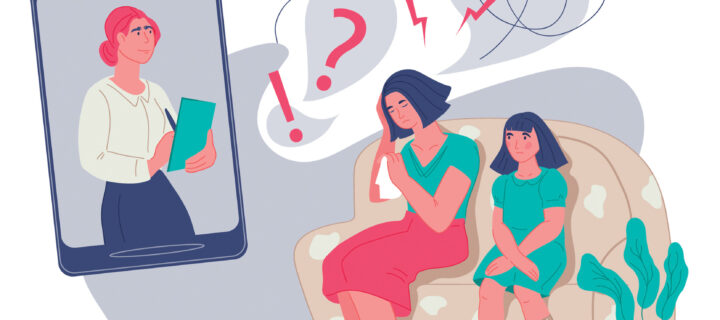Dr. Ramirez-Moya shares the importance of an early diagnosis and psychiatry treatment in adolescents
By Allison Hopkins
Dr. Lorerky Ramirez-Moya is devoting her life to diagnosing and treating mental health issues in children and in adults who have developmental disabilities and need psychiatric care. She is also a wife and mother of two kids, who is making sure her 11-year-old autistic son is getting the one-on-one education he needs. I can sense her energy, and passion for her job and it is very apparent that hard work is nothing new to this woman, who is a native of Costa Rica, and the first generation of her family to go to college. It is unfortunate that so many families are continuing to choose her service as a last resort, and often not at all.
“When a child comes to me, the first thing the parent says is ‘I am here because I’ve tried everything you can imagine…I am here because I have no choice,’” says Ramirez-Moya. “We have a lot of work to do in this fight against the stigma of seeking psychiatry treatment.”
Most of Ramirez-Moya’s patients are 4 to 17-year-olds and she is working tirelessly to educate their parents that depression, anxiety, bipolar disorder, and obsessive-compulsive disorder are diseases that need to be treated, just like every other disease. Once they understand, then she can teach them about the right steps to take at home (if your child is panicking, help them to breathe versus telling them they are fine). “The more we know, the better we will be at advocating for our children,” she says.
It’s time that we listen.
Ten Take-Aways from My Meeting with Dr. Ramirez-Moya at Community Psychiatry, California’s Largest Outpatient Mental Health Organization
There are three major things to watch for in your child regarding their mental health: Insomnia (taking 2-4 hours to fall asleep at night), a change in grades/failing class, and isolating themselves.
Children need 9-10 hours of sleep and it needs to be at night. The pandemic has resulted in a lack of schedule for many kids, who are staying up late on social media and sleeping during the day. Some of her patients who were stable have regressed.
Anxiety can become noticeable starting around age 11; depression around ages 16-17. “Before 11, it’s all tantrums,” says Ramirez-Moya. “There’s not enough language skills, and it’s ‘I’m afraid to go outside, and I’m afraid something bad is going to happen to my family.’ Something happens at 11…parents start seeing more clear symptoms of anxiety, like social anxiety. Around 16 years old, parents can start seeing the first symptoms of depression, such as low motivation, insomnia, and irritability.”
You might think your child’s attitude is just who they are. Your child may believe that as well. “I explain to them that their symptoms are making them feel sick,” says Ramirez-Moya. “Parents think he is just a miserable guy. I explain that he is miserable because he has a disease.”
Adolescents don’t like to be alone in the house. Her patients say that they feel better around other people.
Parents have a lot of fear about the FDA’s black box warning on antidepressants which states that the medication can cause suicides. Ramirez-Moya encourages parents to use National Alliance on Mental Illness (NAMI.org) as a resource and mentions that we need more research to understand this side effect. “How many children are we losing by suicide because the parents were so concerned about the black box warning?” she questions. “If we educate parents about the efficacy of early treatment of mental illness, we will be able to reach more children and change the prognosis, helping more kids become future productive adults.”
There are four FDA-approved mental illness medications for children: Celexa, Lexapro, Zoloft, and Prozac. “We have been using antidepressants for 60 years in children and we have not found any significant long-term side effects,” says Ramirez-Moya. “Sometimes, they [parents] are not concerned to start anti-psychotic or ADHD medications for their child when the medication is prescribed by other providers. I have more concerns for short and long-term side effects with those medications.” She explains that anti-psychotics are being used to treat children who are easily agitated or experience extreme anxiety.
If you can treat a mental illness earlier, the outcome is always going to be the best. 90% of the families who come to her office have no other options. They have tried supplements, diets, and possibly psychotherapy, but they are embarrassed to go to a psychiatrist, or they might have a cultural belief against it. “What we see now is those kids who were not diagnosed found alcohol and marijuana,” she says. “Then they self-medicate themselves. That’s what we want to prevent.”
Kids are afraid to see a psychiatrist because they will have to tell their story again. Ramirez-Moya explains to the child that she is a doctor who follows protocols and treats diseases the same way their pediatrician does. “Children are very concrete thinkers and as psychiatrists we have to be very straightforward with how to ask children questions,” she explains.
A conversation might start as follows:
Doctor: Are you depressed?
Child: No.
Doctor: Tell me from 1 to 10 how much energy you have every day. Think about kindergarten when you woke up so happy.
Child: Okay, that was a 10.
Doctor: Think about the worst day when you didn’t want to get out of bed.
Child: Okay, that was a 0.
The best part of her job is if she can wean a patient off medication and they have been off for six months without any symptoms. “The best day of my life is when I discharge them [patients] from the office and I say bye,” she says, explaining that this is the ultimate goal.
I’m honored to have met Dr. Ramirez-Moya, who is caring for the kids in our community and working each day to fight the stigma against psychiatry care associated with mental illness. If it reaches one parent and benefits one kid, this is a success.
For more information, please visit communitypsychiatry.com or call (855) 427-2778.






